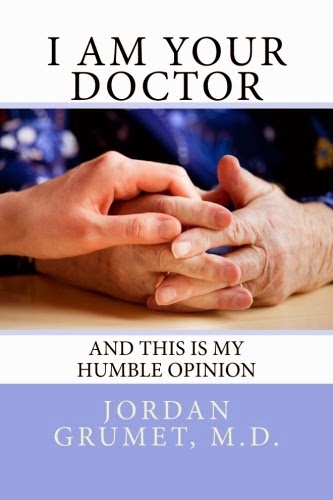Dr Jordan Grumet is a primary care physician in Ohio who tries to assure his patients of a strong relationship, one in which they can build trust. Recently he has reduced his practice to about 600 patients and become “concierge.” Now he has more time for his patients and even some time for his family. For years he has written a blog entitled “In My Humble Opinion” in which he records his thoughts of events in his practice, in his home life and in his wide ranging mind. His posts are thoughtful, thought provoking, engaging, emotional and educational. Recently he published book curated from his posts and arranged into meaningful sections such as “The Grateful Death” or “In Sickness or in Sorrow.”
Dr Grumet’s book is a must read for anyone who cares – cares about their health, cares what they or their family receive from medical professionals, cares about what the doctor or nurse offers to their patients. I have read Dr Grumet’s blog intermittently for the past few years. Always it leaves me with the sense that here is a real human being doing what he does best – caring for patients, one at a time and in the process trying to care for himself and his family. His book title – “I Am Your Doctor” – implies not a fact but a responsibility that he accepts when you come to him. The cover picture is equally powerful – a hand holding another’s, a clear and compelling symbol that this is a physician who wants to have a real relationship with you, his patient. Relationship medicine has largely been lost to today’s business and economic imperatives but doctors like Grumet are trying their best to retain it in their everyday practice. Dr Grumet brings us back to the true calling of what it is to be a physician and in his humble manner but compelling writing style reminds us that physicians are human with of the frailties and foibles as everyone else – the longings, the joys and the sorrows. But especially they want to be there with you as you experience those joys and sorrows, those exhilarations and frustrations that come with life, living and eventually dying. Here are two excerpts:
“Two weeks from now I will tell a man he is going to die. He will sit calmly in my exam room as he shifts his weight from side to side. Although his hair has grayed and his body has weakened, his face will sparkle with youth and vibrancy. He’ll stare deeply into my eyes and I’ll detect a hint of mirth. “We’re all dying, my friend.” He will draw in a deep breath and put his hand on my shoulder. “The trick is learning how to live!”
“It’s not exactly Dr. Jekyll and Mr. Hyde, but everybody knows my level of patience varies from time to time. So I was surprised to find myself happily telling the emergency room that I would assess the patient shortly. The kids were horsing around on the playground, and I knew I would have to call my wife and ask her to come home. It would be my second 45-minute trip to the hospital on an otherwise busy Saturday afternoon. For some reason today, I was able to sublimate the automatic annoyance and return without emotional drama. I slowed down, calmly listened to the patient and reassuringly put a plan into place. Driving home, I felt both relieved and saddened by the joy that overcame me. Why didn’t my life’s work make me feel this way all the time? I guess it starts with one simple fact. I blame myself for every heart attack, stroke or new diagnosis of advanced cancer. As disturbing as that sounds, how could I not?”
Read this book and you will want him to be your doctor. Or at least you will want to find a primary care physician like him who practices real relationship medicine the way he does and who assures you that you will have his or her undivided attention

